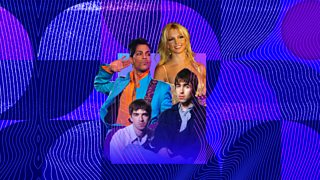From Mr Brightside to The Invincibles, from Strictly to Kelly Holmes' Golden Olympics - 10 moments that shaped 2004
Last Updated: 9 January 2024
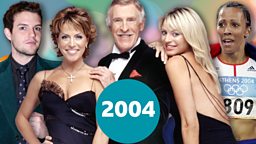
To celebrate the start of 2024, ±«Óãtv Radio 2 and ±«Óãtv Radio 1 are taking a nostalgic look back at music and memories from years ending in 4, from 1964 to 2014.
As part of this collection, The Sounds of 2004 recalls the year of The Incredibles, The Invincibles, Britney's Toxic, the arrival of 'The Special One', and the start of a major chart run for The Killers' Mr Brightside. It was also the year we celebrated Kelly Holmes' two gold medals at the Olympics, watched the first episode of Strictly and the last episode of Friends, and said goodbye to a radio legend.
2004 is also revisited in special editions of Love Songs Extra and Radio 1 00s.
Below we look back on a selection of memorable moments from the year in music and popular culture, 20 years on…
-
![]()
All the 4s
Get nostalgic with music and memories turning 30, 20 and 10 in 2024.
1. Mr. Brightside spent its first of nearly 400 weeks in the UK Singles Chart
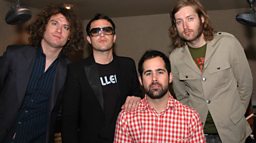
After failing to chart on its initial release in 2003, Las Vegas band The Killers re-released debut single 'Mr. Brightside' in 2004. Second time round it proved to be a moderate hit, entering the UK Singles Chart at No.10, but spending just four weeks in the Top 100 before disappearing, seemingly for good, as the band moved on to promoting their debut LP Hot Fuss.
Little did anyone know at the time, but this particular indie pop anthem was to prove an unstoppable phenomenon in the years to come and would go on to write its own place in the history books.
Fast forward 20 years and the track is nearing its 400th week on the UK Singles Chart - marking the start of 2024 with a return to the Top 40. Its ongoing popularity on streaming services, where it appears on tens of thousands of playlists, and through downloads, has helped it smash the record for longest run in the Top 100 - Lewis Capaldi's Someone You Loved is just over 170 weeks behind in second place (as of Jan 2024) - while becoming one of the 21st century's most iconic songs in the process. Not bad for a track that's never got higher than No.10 in the charts!
- ±«Óãtv News: Mr Brightside - the hit that just won't die
- [Disclaimer: Third-party videos may contain adverts]

2004 also saw Britney Spears return to the top of the UK Singles Chart for the first time since 2000, with one of her signature tunes 'Toxic' and the less well remembered 'Everytime'. It's the last year to date she topped the charts as a solo artist, although in 2012 she teamed up with will.i.am for the UK No.1 'Scream and Shout.'
Other chart-toppers included the expletive-laden 'F*** It (I Don't Want You Back)' and the response song 'F.U.R.B.' by Eamon and Frankee respectively - the two were initially reported to be ex-lovers, but it later transpired they'd never met.
The year also saw big hits for Eric Prydz's 'Call On Me', DJ Casper's 'Cha Cha Slide', Outkast’s 'Hey Ya', and LMC's Whitney/U2 mash-up, 'Take Me To The Clouds Above.'
And two decades on from the original 'Do They Know It's Christmas', Band Aid 20, featuring the likes of Coldplay, Dizzee Rascal, Dido, Robbie Williams, Joss Stone, Beverley Knight and more of the biggest pop stars of the time took the song back to No.1.
2. Kelly Holmes struck gold in Athens
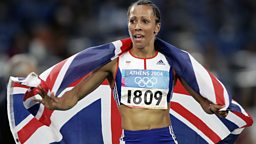
The 2004 Summer Olympics was always going to be a memorable one. After all, it saw the Olympics return to its birthplace for the first time since the modern Olympics' inaugural Games in 1896. The motto for the Games was "Welcome ±«Óãtv" and its stunning opening ceremony drew heavily upon classical and Ancient Greek themes.
There were plenty of unforgettable moments from the sporting events themselves too. British rower Matthew Pinsent won his fourth (and final) Olympic gold in the Men's Coxless four. Boxer Amir Khan, aged just 17, made his mark by picking up a silver in the Men's Lightweight. And in the Velodrome Chris Hoy and Bradley Wiggins' medal haul set the wheels in motion for a golden age of British cycling that continued into this year's Tokyo Olympics.
Elsewhere, Ben Ainslie won the second of his four consecutive golds and Australian swimmer Ian Thorpe won gold in the 200m and 400m freestyles in his last Olympics. The British men's relay team, meanwhile, triumphed in the 4x100 m relay.
The biggest star of Athens 2004, however, had to be Kelly Holmes. The runner had already taken home a bronze at the 2000 Olympics in Sydney, but four years on made history. In winning the Women's 800m final and the 1500m final, with a pair of dazzling performances, she became the first British athlete in 84 years to complete the middle-distance double at the Olympic Games.
Having suffered a series of injuries earlier in her career, Holmes admitted that she had considered retiring prior to her double gold wins. "My career has been such a roller-coaster," she said in the aftermath. "But I just kept sticking in there and I knew in my heart that there was something in there for me to fulfil my dreams."
3. Arsenal proved Invincible
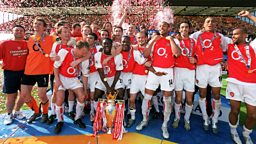
There's winning a title, then there's doing it in style, and the Premier League-winning Arsenal team of 2003-2004 cemented their place in the history books by going an entire season unbeaten. It was a feat that had previously been achieved by the Preston North End team of 1888–89, but a first in modern football - and an achievement that has not been replicated since.
Known as The Invincibles, Arsenal were spearheaded by the likes of Thierry Henry, Dennis Bergkamp, Patrick Vieira, Freddie Ljungberg and Robert Pires. Topping the league summit by 11 points, Arsene Wenger's side notched up 26 wins and 12 draws across 38 league games, and even extended their unbeaten spree into the following season (their run coming to an end in October 2004 after an away defeat to Manchester United).
Defining moments of the 2003-2004 season included a dramatic comeback against Liverpool, Henry's fine form (his 30 goals earned him the season's Golden Boot) and, of course, Man United striker Ruud Van Nistelrooy's famed late-in-the-day penalty miss at Highbury.
Reflecting on the season 10 years on, Henry told ±«Óãtv Sport in 2014: "The key was our togetherness. That team was special because of the unselfishness of everyone. The generosity of that team was outstanding and we always wanted to share with each other. That's something that is pretty rare."
This was to prove the last of Arsene Wenger's - and to date Arsenal's - Premier League titles. On the other side of London, in the summer of 2004, Chelsea appointed Jose Mourinho, the self-declared 'Special One', as their new boss. In his first season in charge, Mourinho took the club to its first title in 50 years, signalling a shifting in the balance of power in English football.
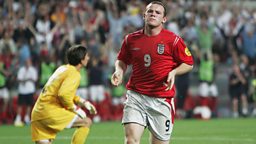
Elsewhere in the footballing world, Euro 2004 saw Greece crowned as champions in Portugal, marking perhaps the biggest shock in the history of the European Championships. A young Wayne Rooney shone bright during the tournament too, scoring four goals overall (one goal behind tournament top scorer Milan Baroš) before being injured as England were knocked out in the quarter final to the host nation, on penalties of course!
Other sporting highlights from the year included Maria Sharapova winning Wimbledon, breaking Serena and Venus Williams' run of victories that stretched back to the turn of the century. Roger Federer, meanwhile, won the Mens' Singles. Over in the US, though, headlines were dominated by the infamous wardrobe malfunction involving Janet Jackson and Justin Timberlake during the Super Bowl half-time show. Incidentally, New England Patriots won the NFL's top prize that year, beating the Carolina Panthers to mark Tom Brady's second Super Bowl win.
4. Saturdays became Strictly night, but it was the end of Friends on Fridays
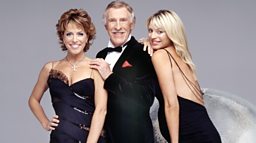
Strictly Come Dancing is now not only such a Saturday night telly staple but a national cultural treasure too, that it's hard to remember a time when it wasn't on our screens. But, in fact, it was in May 2004 that Strictly first arrived on ±«Óãtv One - giving us not one but two series in 2004 as a whole.
Co-hosted by Tess Daly and the late great Sir Bruce Forsyth, Series 1 was won by newsreader and broadcaster Natasha Kaplinsky, along with soon-to-be-household-name Brendan Cole. The pair fended off competition from seven other celebrities and their dancing partners, including Bargain Hunt's David Dickinson, Brookside's Claire Sweeney and former England rugby player Martin Offiah.
Series 2, running from October to December, meanwhile saw soap actress Jill Halfpenny triumph with her dancing partner Darren Bennett. While Julian Clary and Denise Lewis made it to the grand final, Carol Vorderman, Esther Rantzen and Aled Jones all fared less well, being eliminated earlier in the series. By the end of 2004, Strictly was averaging a huge 9 million viewers per episode.
But while we said hello to one new TV phenomenon, we were also saying goodbye to another in 2004, with Friends coming to an end after 10 seasons. Airing on 28 May 2004, the Friends final episode was Channel 4's most-watched show of the year, attracting 8.6 million (more than a third of the country's TV-watching audience) to see the conclusion of the long-running will-they-won't-they between Ross and Rachel.
Other TV shows turning 20 in 2024 include the debut season of a drama that got everyone speculating as to just what was going on, Lost, Peppa Pig mesmerising pre-schoolers the country over (Katy Perry and Orlando Bloom are lined up for the programme's big screen 20th anniversary special), while Peter Andre and Katie Price met for the first time on I'm A Celebrity (sending 'Mysterious Girl' back into the charts in the process). The X Factor also debuted in 2004, making a music juggernaut and TV baddie out of Simon Cowell and, in its first series, propelling South Londoner Steve Brookstein to No.1 with a cover of Phil Collins' Against All Odds.
5. The Facebook was born, but you could only join if you went to Harvard

These days, social media powerhouse Facebook has over 2 billion monthly active users. But back in 2004, it was known as "The facebook" and its much more modest user base was limited to only Harvard University students in Cambridge, Massachusetts in the US.
Founder Mark Zuckerberg set up the site in February 2004 in order to connect Harvard's students with each other, like a virtual version of a school year book (or "face book"), working on the project with his college dorm mates. He told the University's student paper at the time: "Everyone's been talking a lot about a universal face book within Harvard... I think it's kind of silly that it would take the University a couple of years to get around to it. I can do it better than they can, and I can do it in a week."
Within a day of the site's launch, over 1,000 Harvard students had already signed up, and the number of profiles rose to over half of the University's undergraduate base after a month. By March, the site had started allowing sign ups from students of other Ivy League schools, including Columbia, Stanford and Yale. During the summer, Napster co-founder Sean Parker came on board as company president and Zuckerberg and co. moved their base to Palo Alto, California (later moving to its permanent HQ in Menlo Park, California in 2012).
The rest is history, as they say, with Facebook going on to become one of the most popular and powerful platforms on the Internet, and inspiring the 2010 film 'The Social Network' which told the story of its origins.
In 2019, argued of Facebook's place as a profound digital time capsule, noting: "In a little more than a decade, Facebook’s users have contributed to a massive depository of information that documents both our reactions to events and our evolving customs with a scope and immediacy of which earlier historians could only dream."
Another big social media site of the time was MySpace, which in 2004 was pivoting its M.O from being a file-sharing site into the social media sphere. Fronted by public-facing founder Tom "Tom From MySpace" Anderson (everyone's very first "friend" on the platform), the site found an avid audience at the cross section of music and youth culture. It would soon be sold to Rupert Murdoch's News Corporation in 2005 at a time when it had 16 million monthly users. But while the site that would soon become known as simply Facebook was here to stay, MySpace's meteoric rise would soon peter out by the end of the decade.
6. The Lord of the Rings swept the board at the Oscars
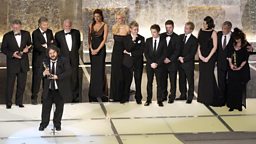
Following the 2003 release of the third and final instalment of the Lord of the Rings trilogy, The Return of the King, (the ±«Óãtv review at the time read: "Majestic, moving and immense, The Lord Of The Rings: The Return Of The King is about as awesome as cinema gets") the fantasy franchise went on to reign supreme at the 76th Academy Awards in 2004.
Winning all 11 awards that it was nominated for, including Best Director, Best Adapted Screenplay and the coveted Best Picture, the Return of the King equalled the Oscars record for the most accolades won in one year. It was also the first fantasy film ever to win Best Picture and only the second sequel to pick up the big prize (after The Godfather Part II).
An impressive ending to one of the best-selling film franchises of all time.
2004 was responsible for a whole host of films that remain firm family favourites to this day, bringing us The Incredibles, Polar Express, Shark Tale, School of Rock, Anchorman, and Shaun of the Dead.
It was a big year for sequels too, serving up Spiderman 2, Kill Bill 2, Scary Movie 3, Shrek 2, Ocean’s Twelve, Bridget Jones: The Edge of Reason, plus Harry Potter and the Prisoner of Azkaban.
7. We got closer to Mars than ever before
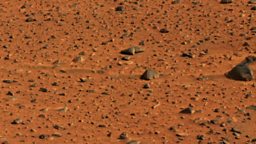
We were all dreaming of the possibility of life on Mars again in January 2004 as NASA sent two 'robotic geologists' (named Spirit and Opportunity) to the planet as part of the Mars Exploration Rover mission.
Launching from Florida’s Cape Canaveral Space Launch Complex in the summer of 2003, the pair of exploration rovers landed at two separate sites on the Martian surface in January 2004. "This is a big night for NASA," NASA Administrator Sean O'Keefe said at the time. "We're back. I am very, very proud of this team, and we're on Mars."
The mission was only originally planned for 90 days, but Spirit and Opportunity stayed on Mars for much longer (Spirit was active until 2010, and Opportunity until 2018), sending back camera imagery and scientific information that would give us valuable knowledge about the planet.
"Carrying identical, sophisticated sets of science instruments, both rovers have found evidence of ancient Martian environments where intermittently wet and habitable conditions existed," NASA have since in their assessment of the mission.
8. Paul McCartney played a hit-packed set at Glastonbury
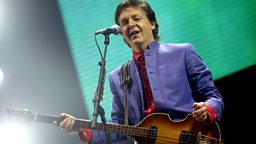
"Spare a thought for Michael Eavis. He could live to host a hundred more Glastos and he'd never top this," NME wrote in its review of Paul McCartney's Glastonbury headline set in 2004, adding: "And pity us poor punters, oblivious to the fact we are sinking in mud and soaked to the skin, because every gig we go to from now will fall short of this."
High praise indeed, and for good reason as the Beatles icon delivered a massive 33-song, two encore, hit-filled set that included everything from 'Hey Jude' and 'Yesterday' to solo tracks and Wings songs, with even a George Harrison cover. Glastonbury founder Michael Eavis said afterwards: "Paul won the day for me. He put so much into it. He hugged and kissed me afterwards but I should have kissed him. McCartney was the strongest act by far."
Macca's Pyramid Stage set went down in history far beyond just 2004, and is now regarded as an all-time great - named by (requires registration). 18 years later, in 2022, McCartney returned to the Pyramid Stage for another memorable set.
Over at Reading + Leeds, though, some performances were not as widely beloved. Both rapper 50 Cent and Finnish pop-rockers The Rasmus were forced to abandon their sets in 2004 after angry responses from festival-goers.
9. Scissor Sisters' debut was the year's best-selling album in the UK
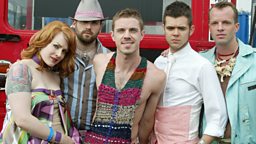
Founded in the LGBTQ+ nightlife scene of New York and fronted by an Arizona native, it was actually in the UK that Scissor Sisters first found fame. This shouldn't come as a surprise, really, as this was a band with the swagger, playfulness and bombastic dancey and glam-inspired pop anthems that could be traced back in sound and style to the likes of Queen, Pet Shop Boys or Elton John (who they would later work with).
Scissor Sisters’ debut, released in February 2004, reached No.1 in the UK (peaking at only 102 in the US), spawned the hit singles 'Filthy/Gorgeous', 'Comfortably Numb', a unique take on the Pink Floyd classic, and 'Take Your Mama'. The year’s best-selling album in the UK, it has since sold over 2 million copies, remaining to this day in the UK's Top 40 biggest selling albums of all-time list.
It wasn't just a chart success this side of the pond, but a critical one too. The ±«Óãtv review at the time said: "You'll be hard pushed to find a better and more accomplished debut for the rest of the year. Both the album and the band are not afraid to be fabulous, and for that alone they deserve your full attention. Absolutely brilliant."
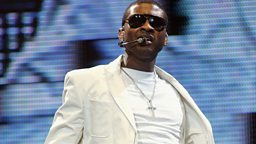
Other artists with big selling albums this year included Usher, with Confessions, which featured two UK No.1 singles 'Yeah' and 'Burn', plus 'My Boo', a collaboration with Alicia Keys; Keane, whose debut Hopes and Fears was the first of five UK Album Chart toppers for the band; and Katie Melua, whose 2003 debut Call Off The Search climbed to No.1 in 2004. The album featured 'The Closest Thing To Crazy', much beloved of Terry Wogan on the Radio 2 Breakfast Show at the time.
Albums by Snow Patrol, Maroon 5, Franz Ferdinand, Joss Stone, Il Divo, and The Streets also found their way into many a record collection this year.
2004 also saw the release of what proved to be the final George Michael studio album Patience, which reached top spot in the UK and included the Top 10 singles 'Freeek!', 'Amazing' and 'Flawless (Go to the City)'.
10. Generations of music fans mourned the death of John Peel
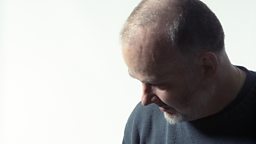
At the time of his death John Peel was Radio 1's longest-serving DJ and the influence of his 40-year radio career remains unrivalled. Described by fellow DJ Paul Gambaccini as "the most important man in music for about a dozen years." Peel, who had also joined Radio 4 to host Saturday morning show ±«Óãtv Truths, was known for his extensive music knowledge, his varied tastes, his landmark live sessions, but also his warm personality, which made him much loved by millions of avid listeners over the years.
Jo Whiley, who presented ±«Óãtv's Glastonbury coverage alongside Peel, said of the news: "John was simply one of my favourite men in the whole world - as a music fan and presenter he was simply an inspiration." Musician Bernard Sumner, meanwhile, paid tribute by saying: "If it wasn't for John Peel, there would be no Joy Division and no New Order. He was one of the few people to give bands that played alternative music a chance to get heard, and he continued to be a champion of cutting-edge music throughout his life."
Announcing Peel's death on Radio 1 in October 2004, the station played The Undertones' 1978 classic 'Teenage Kicks', widely known as the DJ's favourite song. The band's bass player Michael Bradley after his passing: "Personally, I find it incredible what he did for the band... He always had his finger on the pulse of the music industry."
-
![]()
All the 4s
Get nostalgic with music and memories turning 30, 20 and 10 in 2024.
More Noughties Nostalgia
-
Coldplay, Kylie's comeback, and the Millennium Dome: 20 things that will make you feel nostalgic for the year 2000
-
From Wizards to Wernham Hogg to Wikipedia: 21 memorable moments in music and popular culture from 2001
-
Pop Idols, Memorable Movies, and an Office Romance: 12 massive moments that shaped 2002
-
From Harry Potter fever to the UK's hottest day: 15 huge moments that shaped 2003
Like us on , on Instagram at , or follow us on Twitter
